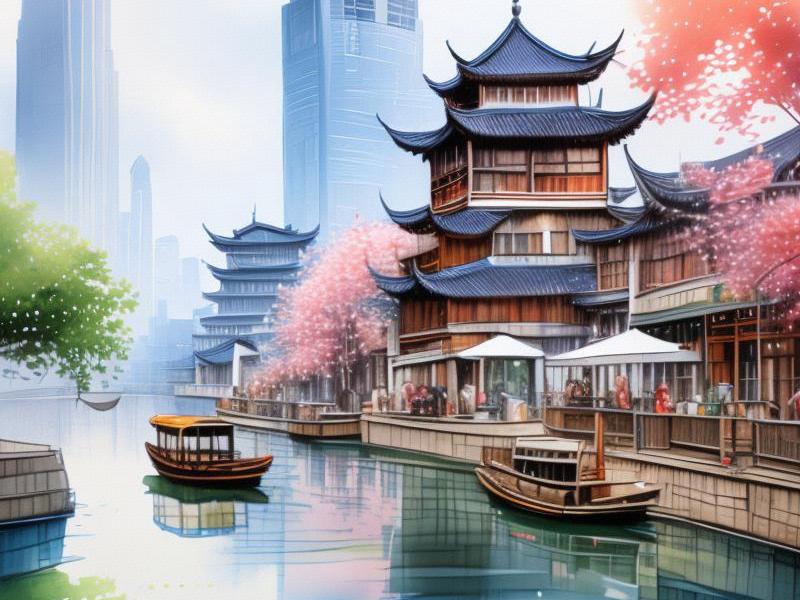Shanghai, a vibrant city on the banks of the Huangpu River, has long been a symbol of China's modernization and openness. As one of the world's most dynamic metropolises, Shanghai not only showcases the rapid economic growth of China but also serves as a bridge between the East and the West, blending diverse cultures and ideas.

Shanghai, known as "The Paris of the East," is a city that seamlessly blends tradition with modernity. Its skyline, dominated by the iconic Oriental Pearl Tower and the futuristic Shanghai Tower, is a testament to its rapid urban development. Yet, amidst this concrete jungle, one can still find the serene beauty of ancient temples and the charming alleys of the French Concession.
The history of Shanghai dates back to the Song Dynasty, but it was during the 19th century that the city began to transform into a global trading hub. The opening of the port to foreign trade in 1842 marked the beginning of Shanghai's rise as a cosmopolitan city. The Bund, with its colonial-era architecture, stands as a living museum of this era, offering a glimpse into the city's rich past.
In the 20th century, Shanghai became the financial and cultural center of China. The city's rapid industrialization and urbanization attracted people from all over the country, creating a melting pot of cultures and dialects. This diversity is reflected in the city's cuisine, with Shanghai's signature dishes like Xiaolongbao (soup dumplings) and Shengjianbao (pan-fried buns) being loved by locals and tourists alike.
Today, Shanghai is a global financial hub, home to the world's busiest container port and one of the largest stock exchanges in Asia. The city's Pudong district, once a rural area, has been transformed into a modern financial district, housing the headquarters of many multinational corporations. The Jin Mao Tower, the Oriental Pearl Tower, and the Shanghai World Financial Center are some of the tallest buildings in the world, symbolizing the city's economic prowess.
爱上海最新论坛 However, Shanghai's charm lies not just in its skyscrapers but also in its rich cultural heritage. The city is home to numerous museums, art galleries, and theaters, offering a wide range of cultural experiences. The Shanghai Museum, with its extensive collection of Chinese art, is a must-visit for art enthusiasts. The city's vibrant theater scene, featuring everything from traditional Chinese opera to modern Broadway shows, showcases the city's cultural diversity.
Shanghai's blend of tradition and modernity is perhaps best exemplified by the Yu Garden, a classical Chinese garden built in the Ming Dynasty. Nestled in the heart of the bustling city, this serene oasis offers a glimpse into the traditional Chinese lifestyle. The adjacent Yuyuan Bazaar, with its shops selling traditional handicrafts and snacks, provides a taste of the old Shanghai.
The city's commitment to sustainability and green development is also noteworthy. Shanghai has been investing in renewable energy, green buildings, and public transportation to reduce its carbon footprint. The city's extensive metro system, one of the most efficient in the world, encourages residents and visitors to use public transport, reducing traffic congestion and air pollution.
Shanghai's international influence is evident in its role as a host to major global events. The city has successfully hosted the APEC Leaders' Summit, the World Expo, and the Asian Games, showcasing its ability to organize large-scale international events. These events have not only boosted the city's global profile but also contributed to its economic development and cultural exchange.
上海品茶论坛
The city's education system is another area where Shanghai excels. With several world-renowned universities, including Fudan University and Tongji University, Shanghai is a hub for academic research and innovation. The city's emphasis on education and talent development has played a crucial role in its economic success.
Shanghai's tourism industry has also flourished in recent years. The city's rich history, vibrant culture, and stunning architecture attract millions of tourists from around the world each year. The Bund, the Yu Garden, the Shanghai Museum, and the Nanjing Road shopping street are some of the city's most popular attractions.
However, like any other rapidly developing city, Shanghai faces its own set of challenges. The high cost of living, traffic congestion, and environmental issues are some of the concerns that the city is working to address. The government has implemented various measures to improve the quality of life for its residents, including the expansion of public transportation, the promotion of green spaces, and the development of affordable housing.
419上海龙凤网 Despite these challenges, Shanghai remains a beacon of hope and opportunity. Its resilience and adaptability have allowed it to thrive in the face of adversity. The city's spirit of innovation and openness continues to attract people from all over the world, making it a truly global metropolis.
In conclusion, Shanghai is a city that embodies the best of China's modernization and openness. Its blend of tradition and modernity, its rich cultural heritage, and its global influence make it a unique and fascinating place to visit. Whether you are interested in history, culture, or modern architecture, Shanghai has something to offer for everyone.
As Shanghai continues to grow and evolve, it remains a symbol of China's progress and a testament to the city's ability to embrace change while preserving its roots. The city's story is one of resilience, innovation, and cultural integration, making it a truly remarkable place in the heart of China.